#against queering the map
Text
What’s the hanky code for “I want to destroy the government before I hear it say my name?”
from Against Queering the Map, by Aeon Ginsberg
#aeon ginsberg#hanky code#queer#queering the map#against queering the map#an anthology of radical trans poetics#we want it all#trans#gender#transgender#marginalia#anti capitalism#antifa
15 notes
·
View notes
Quote
They won't let us donate our blood but they'll let us spill it onto the concrete.
Aeon Ginsburg, “Against Queering the Map” from We Want It All: An Anthology of Radical Trans Poetics
#We Want It All#poetry#aeon ginsburg#radical trans poetics#queer poetry#trans poetry#against queering the map#books#booklr
2 notes
·
View notes
Text
seeing a few posts about it on the dash tonight is reminding me of my phase a few years ago where i added a whole bunch of fabricated stories to queering the map
#:)#back when it was newish i looked in an area near me and there was nothing there#so i spent a couple weeks coming up with like half a dozen compelling convincing fictional queer stories that got approved on the map#in the years since nobody ever actually added to the region so the only stuff there is the silly shadowplay fiction i made up by myself lol#sometimes i feel guilty about doing it because it was kinda disingenuous and against the spirit of the thing#but like idk. maybe someone local has/will look at this area and see my fake pins and feel less alone than they actually are lol
7 notes
·
View notes
Text
17/12/23 this masterlist has been completely, vetted, revamped and reformatted with free access to all reading and viewing material. It will be updated and edited periodically so please click on my username and reblog the current version directly from me if you're able.
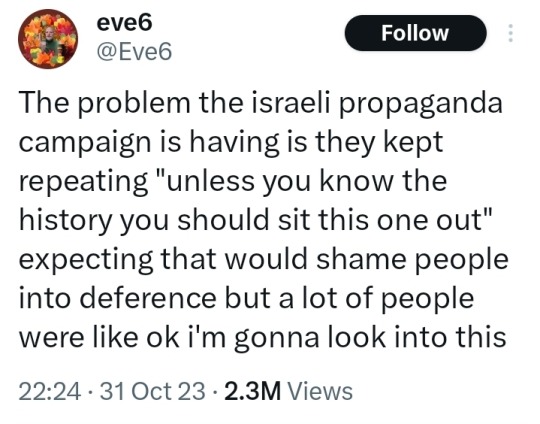
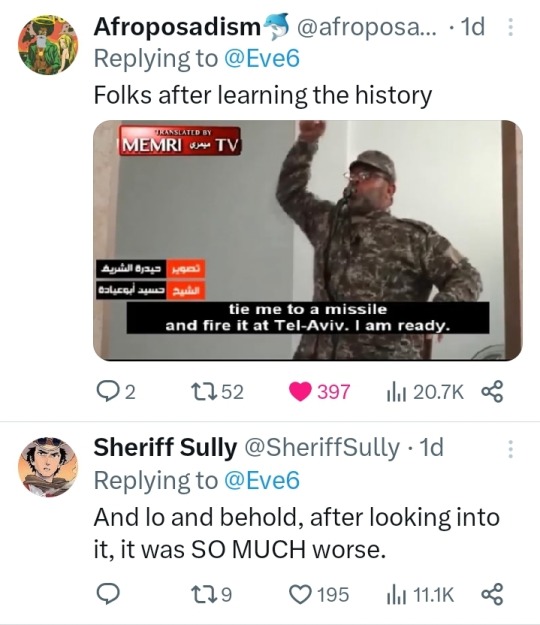

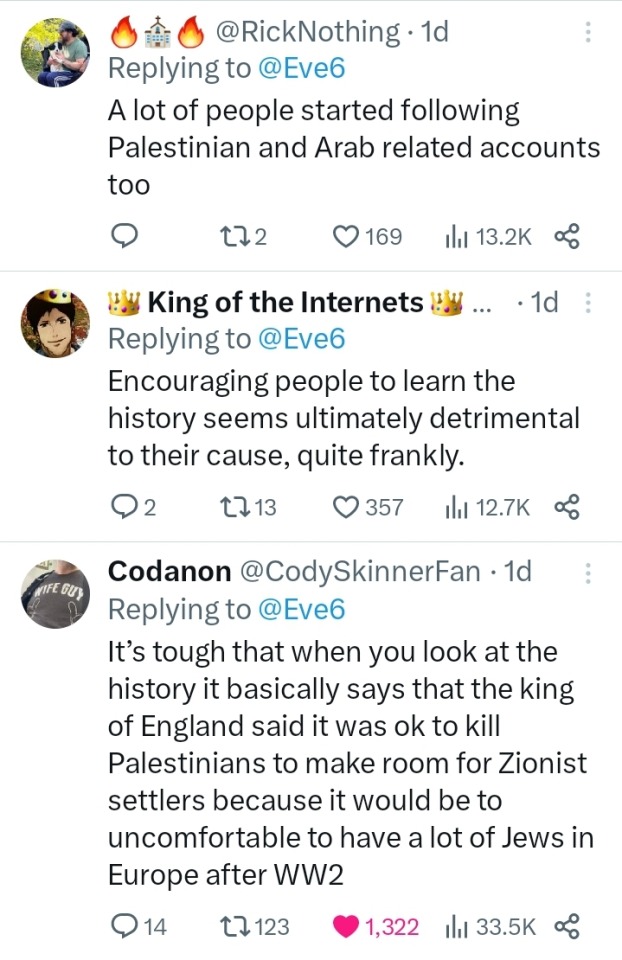
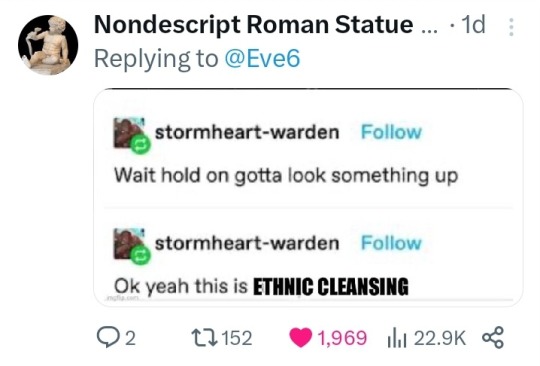
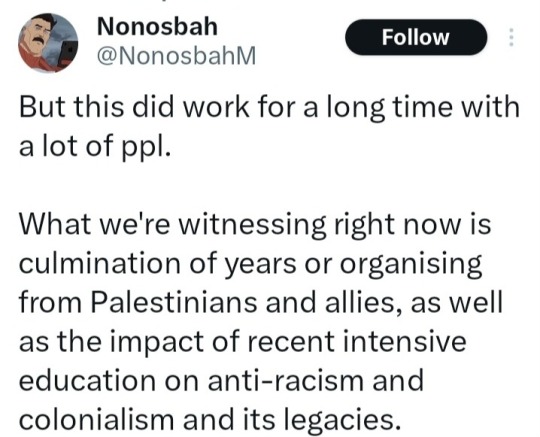
The Big Damn List Of Stuff They Said You Didn't Know
(Yes, it's a lot. Just choose your preferred medium and then pick one.)
Podcasts
Backgrounders and Quick Facts
Interactive Maps
Teach-Out Resources
Reading Material (free)
Films and Documentaries (free)
Non-Governmental Organizations
Social Media
How You Can Help
Podcasts
Cocktails & Capitalism: The Story of Palestine Part 1, Part 3
It Could Happen Here: The Cheapest Land is Bought with Blood, Part 2, The Balfour Declaration
Citations Needed: Media narratives and consent manufacturing around Israel-Palestine and the Gaza Siege
The Deprogram: Free Palestine, ft. decolonizatepalestine.com.
Backgrounders and Quick Facts
The Palestine Academy: Palestine 101
Institute for Middle East Understanding: Explainers and Quick Facts
Interactive Maps
Visualizing Palestine
Teach-Out Resources
1) Cambridge UCU and Pal Society
Palestine 101
Intro to Palestine Film + Art + Literature
Resources for Organising and Facilitating)
2) The Jadaliya YouTube Channel of the Arab Studies Institute
Gaza in Context Teach-in series
War on Palestine podcast
Updates and Discussions of news with co-editors Noura Erakat and Mouin Rabbani.
3) The Palestine Directory
History (virtual tours, digital archives, The Palestine Oral History Project, Documenting Palestine, Queering Palestine)
Cultural History (Palestine Open Maps, Overdue Books Zine, Palestine Poster Project)
Contemporary Voices in the Arts
Get Involved: NGOs and campaigns to help and support.
3) PalQuest Interactive Encyclopedia of the Palestine Question.
4) The Palestine Remix by Al Jazeera
Books and Articles
Free reading material
My Gdrive of Palestine/Decolonization Literature (nearly all the books recommended below + books from other recommended lists)
Five free eBooks by Verso
Three Free eBooks on Palestine by Haymarket
LGBT Activist Scott Long's Google Drive of Palestine Freedom Struggle Resources
Recommended Reading List
Academic Books
Edward Said (1979) The Question of Palestine, Random House
Ilan Pappé (2002)(ed) The Israel/Palestine Question, Routledge
Ilan Pappé (2006) The Ethnic Cleansing of Palestine, OneWorld Publications
Ilan Pappé (2011) The Forgotten Palestinians: A History of the Palestinians in Israel, Yale University Press
Ilan Pappé (2015) The Idea of Israel: A History of Power and Knowledge, Verso Books
Ilan Pappé (2017) The Biggest Prison On Earth: A History Of The Occupied Territories, OneWorld Publications
Ilan Pappé (2022) A History of Modern Palestine, Cambridge University Press
Rosemary Sayigh (2007) The Palestinians: From Peasants to Revolutionaries, Bloomsbury
Andrew Ross (2019) Stone Men: the Palestinians who Built Israel, Verso Books
Rashid Khalidi (2020) The Hundred Years’ War on Palestine: A History of Settler Colonialism and Resistance 1917–2017
Ariella Azoulay (2011) From Palestine to Israel: A Photographic Record of Destruction and State Formation, 1947-1950, Pluto Press
Ariella Azoulay and Adi Ophir (2012) The One-State Condition: Occupation and Democracy in Israel/Palestine, Stanford University Press.
Jeff Halper (2010) An Israeli in Palestine: Resisting Dispossession, Redeeming Israel, Pluto Press
Jeff Halper (2015) War Against the People: Israel, the Palestinians and Global Pacification
Jeff Halper (2021) Decolonizing Israel, Liberating Palestine: Zionism, Settler Colonialism, and the Case for One Democratic State, Pluto Press
Anthony Loewenstein (2023) The Palestine Laboratory: How Israel exports the Technology of Occupation around the World
Noura Erakat (2019) Justice for Some: Law and the Question of Palestine, Stanford University Press
Neve Gordon (2008) Israel’s Occupation, University of California Press
Joseph Massad (2006) The Persistence of the Palestinian Question: Essays on Zionism and the Palestinians, Routledge
Memoirs
Edward Said (1986) After the Last Sky: Palestine Lives, Columbia University PEdward Saidress
Edward Said (2000) Out of Place; A Memoir, First Vintage Books
Mourid Barghouti (2005) I saw Ramallah, Bloomsbury
Hatim Kanaaneh (2008) A Doctor in Galilee: The Life and Struggle of a Palestinian in Israel, Pluto Press
Raja Shehadeh (2008) Palestinian Walks: Into a Vanishing Landscape, Profile Books
Ghada Karmi (2009) In Search of Fatima: A Palestinian Story, Verso Books
Vittorio Arrigoni (2010) Gaza Stay Human, Kube Publishing
Ramzy Baroud (2010) My Father Was a Freedom Fighter: Gaza's Untold Story, Pluto Press
Izzeldin Abuelaish (2011) I Shall Not Hate: A Gaza Doctor’s Journey on the Road to Peace and Human Dignity, Bloomsbury
Atef Abu Saif (2015) The Drone Eats with Me: A Gaza Diary, Beacon Press
Anthologies
Voices from Gaza - Insaniyyat (The Society of Palestinian Anthropologists)
Letters From Gaza • Protean Magazine
Salma Khadra Jayyusi (1992) Anthology of Modern Palestinian Literature, Columbia University Press
ASHTAR Theatre (2010) The Gaza Monologues
Refaat Alreer (ed) (2014) Gaza Writes Back, Just World Books
Refaat Alreer, Laila El-Haddad (eds) (2015) Gaza Unsilenced, Just World Books
Cate Malek and Mateo Hoke (eds)(2015) Palestine Speaks: Narrative of Life under Occupation, Verso Books
Jehad Abusalim, Jennifer Bing (eds) (2022) Light in Gaza: Writings Born of Fire, Haymarket Books
Short Story Collections
Ghassan Kanafani, Hilary Kilpatrick (trans) (1968) Men in the Sun and Other Palestinian Stories, Lynne Rienner Publishers
Ghassan Kanafani, Barbara Harlow, Karen E. Riley (trans) (2000) Palestine’s Children: Returning to Haifa and Other Stories, Lynne Rienner Publishers
Atef Abu Saif (2014) The Book of Gaza: A City in Short Fiction, Comma Press
Samira Azzam, Ranya Abdelrahman (trans) (2022) Out Of Time: The Collected Short Stories of Samira Azzam
Sonia Sulaiman (2023) Muneera and the Moon; Stories Inspired by Palestinian Folklore
Essay Collections
Edward W. Said (2000) Reflections on Exile and Other Essays, Harvard University Press
Salim Tamari (2008) Mountain against the Sea: Essays on Palestinian Society and Culture, University of California Press
Fatma Kassem (2011) Palestinian Women: Narratives, histories and gendered memory, Bloombsbury
Ramzy Baroud (2019) These Chains Will Be Broken: Palestinian Stories of Struggle and Defiance in Israeli Prisons, Clarity Press
Novels
Sahar Khalifeh (1976) Wild Thorns, Saqi Books
Liyana Badr (1993) A Balcony over the Fakihani, Interlink Books
Hala Alyan (2017) Salt Houses, Harper Books
Susan Abulhawa (2011) Mornings in Jenin, Bloomsbury
Susan Abulhawa (2020) Against the Loveless World, Bloomsbury
Graphic novels
Joe Sacco (2001) Palestine
Joe Sacco (2010) Footnotes in Gaza
Naji al-Ali (2009) A Child in Palestine, Verso Books
Mohammad Sabaaneh (2021) Power Born of Dreams: My Story is Palestine, Street Noise Book*
Poetry
Fady Joudah (2008) The Earth in the Attic, Sheridan Books,
Ghassan Zaqtan, Fady Joudah (trans) (2012) Like a Straw Bird It Follows Me and Other Poems, Yale University Press
Hala Alyan (2013) Atrium: Poems, Three Rooms Press*
Mohammed El-Kurd (2021) Rifqa, Haymarket Books
Mosab Abu Toha (2022) Things You May Find Hidden in My Ear: Poems from Gaza, City Lights Publishers
Tawfiq Zayyad (2023) We Are Here to Stay, Smokestack Books*
The Works of Mahmoud Darwish
Poems
Rafeef Ziadah (2011) We Teach Life, Sir
Nasser Rabah (2022) In the Endless War
Refaat Alareer (2011) If I Must Die
Hiba Abu Nada (2023) I Grant You Refuge/ Not Just Passing
[All books except the ones starred are available in my gdrive. I'm adding more each day. But please try and buy whatever you're able or borrow from the library. Most should be available in the discounted Free Palestine Reading List by Pluto Press, Verso and Haymarket Books.]
Human Rights Reports & Documents
Information on current International Court of Justice case on ‘Legal Consequences arising from the Policies and Practices of Israel in the Occupied Palestinian Territory, including East Jerusalem’
UN Commission of Inquiry Report 2022
UN Special Rapporteur Report on Apartheid 2022
Amnesty International Report on Apartheid 2022
Human Rights Watch Report on Apartheid 2021
Report of the United Nations Fact-Finding Mission on the Gaza Conflict’ 2009 (‘The Goldstone Report’)
Advisory Opinion on the Legal Consequences of the Construction of a Wall in the Occupied Palestinian Territory, International Court of Justice, 9 July 2004
Films
Documentaries
Jenin, Jenin (2003) dir. Mohammed Bakri
Massacre (2005) dir. Monica Borgmann, Lokman Slim, Hermann Theissen
Slingshot HipHop (2008) dir. Jackie Reem Salloum
Waltz with Bashir (2008) dir. Ari Folman † (also on Amazon Prime)
Tears of Gaza (2010) dir. Vibeke Løkkeberg (also on Amazon Prime)
5 Broken Cameras (2011) dir. Emad Burnat (also on Amazon Prime)
The Gatekeepers (2012) dir. Dror Moreh (also on Amazon Prime)
The Great Book Robbery (2012) | Al Jazeera English
Al Nakba (2013) | Al Jazeera (5-episode docu-series)
The Village Under the Forest (2013) dir. Mark J. Kaplan
Where Should The Birds Fly (2013) dir. Fida Qishta
Naila and the Uprising (2017) (also on Amazon Prime)
GAZA (2019) dir. Andrew McConnell and Garry Keane
Gaza Fights For Freedom (2019) dir. Abby Martin
Little Palestine: Diary Of A Siege (2021) dir. Abdallah Al Khatib
Palestine 1920: The Other Side of the Palestinian Story (2021) | Al Jazeera World Documentary
Gaza Fights Back (2021) | MintPress News Original Documentary | dir. Dan Cohen
Innocence (2022) dir. Guy Davidi
Short Films
Fatenah (2009) dir. Ahmad Habash
Gaza-London (2009) dir. Dina Hamdan
Condom Lead (2013) dir. Tarzan Nasser, Arab Nasser
OBAIDA (2019) | Defence for Children Palestine
Theatrical Films
Divine Intervention (2002) | dir. Elia Suleiman (also on Netflix)
Paradise Now (2005) dir Hany Abu-Assad (also on Amazon Prime)
Lemon Tree (2008) (choose auto translate for English subs) (also on Amazon Prime)
It Must Be Heaven (2009) | dir. Elia Suleiman †
The Promise (2010) mini-series dir. Peter Kosminsky (Part 1, Part 2, Part 3, Part 4)
Habibi (2011)* dir. Susan Youssef
Omar (2013)* dir. Hany Abu-Assad †
3000 Nights (2015)* dir. Mai Masri
Foxtrot (2017) dir. Samuel Maoz (also on Amazon Prime)
The Time that Remains (2019) dir. Elia Suleiman †
Gaza Mon Amour (2020) dir. Tarzan Nasser, Arab Nasser †
The Viewing Booth (2020) dir. Ra'anan Alexandrowicz (on Amazon Prime and Apple TV)
Farha (2021)* | dir. Darin J. Sallam
Palestine Film Institute Archive
All links are for free viewing. The ones marked with a star (*) can be found on Netflix, while the ones marked † can be downloaded for free from my Mega account.
If you find Guy Davidi's Innocence anywhere please let me know, I can't find it for streaming or download even to rent or buy.
In 2018, BDS urged Netflix to dump Fauda, a series created by former members of IOF death squads that legitimizes and promotes racist violence and war crimes, to no avail. Please warn others to not give this series any views. BDS has not called for a boycott of Netflix. ]
NGOs
The Boycott, Divestment, Sanctions (BDS) Movement
Medical Aid for Palestinians
Euro-Mediterranean Human Rights Monitor
Palestine Defence for Children International
Palestinian Feminist Collective
Al-Shabaka: The Palestinian Policy Network
Addameer Prisoner Support and Human Rights Association
Institute for Palestine Studies
Al Haq
Artists for Palestine
The Palestine Museum
Jewish Currents
B’Tselem
DAWN
Social Media
Palestnians on Tumblr
@el-shab-hussein
@killyfromblame
@apollos-olives
@fairuzfan
@palipunk
@sar-soor
@nabulsi
@ibtisams
@wearenotjustnumbers2
@90-ghost (is in Gaza right now. Please donate to his GFM and boost it.)
@tamarrud
Allies and advocates (not Palestinian)
@bloglikeanegyptian beautiful posts that read like op-eds
@vyorei daily news roundups
@luthienne resistance through prose
@decolonize-the-left scoop on the US political plans and impacts
@feluka
(Please don't expect any of these blogs to be completely devoted to Palestine allyship; they do post regularly about it but they're still personal blogs and post whatever else they feel like. Do not harrass them.)
Gaza journalists
Motaz Azaiza IG: @motaz_azaiza | Twitter: @azaizamotaz9 | TikTok: _motaz.azaiza (left Gaza as of Jan 23)
Bisan Owda IG and TikTok: wizard_bisan1 | Twitter: @wizardbisan
Saleh Aljafarawi IG: @saleh_aljafarawi | Twitter: @S_Aljafarawi | TikTok: @saleh_aljafarawi97
Plestia Alaqad IG: @byplestia | TikTok: @plestiaaqad (left Gaza)
Wael Al-Dahdouh IG: @wael_eldahdouh | Twitter: @WaelDahdouh (left Gaza as of Jan 13)
Hind Khoudary IG: @hindkhoudary | Twitter: @Hind_Gaza
Ismail Jood IG and TikTok: @ismail.jood (announced end of coverage on Jan 25)
Yara Eid IG: @eid_yara | Twitter: @yaraeid_
Eye on Palestine IG: @eye.on.palestine | Twitter: @EyeonPalestine | TikTok: @eyes.on.palestine
Muhammad Shehada Twitter: @muhammadshehad2
(Edit: even though some journos have evacuated, the footage up to the end of their reporting is up on their social media, and they're also doing urgent fundraisers to get their families and friends to safety. Please donate or share their posts.)
News organisations
The Electronic Intifada Twitter: @intifada | IG: @electronicintifada
Quds News Network Twitter and Telegram: @QudsNen | IG: @qudsn (Arabic)
Times of Gaza IG: @timesofgaza | Twitter: @Timesofgaza | Telegram: @TIMESOFGAZA
The Palestine Chronicle Twitter: @PalestineChron | IG: @palestinechron | @palestinechronicle
Al-Jazeera Twitter: @AJEnglish | IG and TikTok: @aljazeeraenglish, @ajplus
Middle East Eye IG and TikTok: @middleeasteye | Twitter: @MiddleEastEye
Democracy Now Twitter and IG: @democracynow TikTok: @democracynow.org
Mondoweiss IG and TikTok: @mondoweiss | Twitter: @Mondoweiss
The Intercept Twitter and IG: @theintercept
MintPress Twitter: @MintPressNews | IG: mintpress
Novara Media Twitter and IG: @novaramedia
Truthout Twitter and IG: @truthout
Palestnians on Other Social Media
Mouin Rabbani: Middle East analyst specializing in the Arab-Israeli conflict and Palestinian affairs. Twitter: @MouinRabbani
Noura Erakat: Legal scholar, human rights attorney, specialising in Israeli–Palestinian conflict. Twitter: @4noura | IG: @nouraerakat | (http://www.nouraerakat.com/)
Hebh Jamal: Journalist in Germany. IG and Twitter: @hebh_jamal
Ghada Sasa: PhD candidate in International Relations, green colonialism, and Islam in Canada. Twitter: @sasa_ghada | IG: @ghadasasa48
Taleed El Sabawi: Assistant professor of law and researcher in public health. Twitter: @el_sabawi | IG
Lexi Alexander: Filmmaker and activist. Twitter: @LexiAlex | IG: @lexialexander1
Mariam Barghouti: Writer, blogger, researcher, and journalist. Twitter: @MariamBarghouti | IG: @mariambarghouti
Rasha Abdulhadi: Queer poet, author and cultural organizer. Twitter: @rashaabdulhadi
Mohammed el-Kurd: Writer and activist from Jerusalem. IG: @mohammedelkurd | Twitter: @m7mdkurd
Ramy Abdu: Founder and Chairman of the Euro-Mediterranean Human Rights Monitor. Twitter: @RamyAbdu
Subhi: Founder of The Palestine Academy website. IG: @sbeih.jpg |TikTok @iamsbeih | Twitter: @iamsbeih
Allies
Lowkey (Kareem Dennis): Rapper, activist, video and podcast host for MintPress. Twitter: @LowkeyOnline IG: @lowkeyonline
Francesca Albanese: UN Special Rapporteur on the Occupied Territories. Twitter: @FranceskAlbs
Sana Saeed: Journalist and media critic, host and senior producer at Al-Jazeera Plus. IG: @sanaface | Twitter: @SanaSaeed
Shailja Patel: Poet, playwright, activist, founding member of Kenyans For Peace, Truth and Justice. Twitter: @shailjapatel
Jairo I. Fúnez-Flores: Researcher in curriculum studies, decolonial theory, social movements. Twitter: @Jairo_I_Funez
Jack Dodson: Journalist and Filmmaker. Twitter: @JackDodson IG: @jdodson4
Imani Barbarin: Writer, public speaker, and disability rights activist. IG: @crutches_and_spice | Twitter: @Imani_Barbarin | TikTok: @crutches_and_spice
Jewish Allies
Katie Halper: US comedian, writer, filmmaker, podcaster, and political commentator. IG and Twitter: @kthalps
Amanda Gelender: Writer. Twitter: @agelender | (https://agelender.medium.com/)
Yoav Litvin: Jerusalem-born Writer and Photographer. IG and Twitter: @nookyelur | (yoavlitvin.com)
Alana Lentin: Professor of Cultural and Social Analysis at Western Sydney University. Twitter: @alanalentin
Gideon Levy: anti-Zionist Israeli journalist and activist. Twitter: @gideonle
How You Can Help Palestine
How to be an Ally 101
📢: Global Strike Guide
If any links are broken let me know. Or pull up the current post to check whether it's fixed.
"Knowledge is Israel's worst enemy. Awareness is Israel's most hated and feared foe. That's why Israel bombs a university: it wants to kill openness and determination to refuse living under injustice and racism."
— Dr. Refaat Alareer, (martyred Dec 6, 2023)
From River To The Sea Palestine Will Be Free 🇵🇸🇵🇸🇵🇸
-----
Edit 1: took the first video down because turns out the animator is a terf and it links to her blog. Really sorry for any distress.
Edit 2: All recommended readings + Haymarket recommendations + essential decolonization texts have been uploaded to my linked gdrive. I will adding more periodically. Please do buy or check them out from the library if possible, but this post was made for and by poor and gatekept Global South bitches like me.
Some have complained about the memes being disrespectful. You're actually legally obligated to make fun of Israeli propaganda and Zionists. I don't make the rules.
Edit 3: "The river to the sea" does not mean the expulsion of Jews from Palestine. Believing that is genocide apologia.
Edit 4: Gazans have specifically asked us to put every effort into pushing for a ceasefire instead of donations. "Raising humanitarian aid" is a grift Western governments are pushing right now to deflect from the fact that they're sending billions to Israel to keep carpet bombing Gazans. As long as the blockades are still in place there will never be enough aid for two million people. (UPDATE: PLEASE DONATE to the Gazan's GoFundMe fundraisers to help them buy food and get out of Rafah into Egypt. E-SIMs, food and medical supplies are also essential. Please donate to the orgs linked in the How You Can Help. Go on the strikes. DO NOT STOP PROTESTING.)
Edit 5: Google drive link for academic books folder has been fixed. Also have added a ton of resources to all the other folders so please check them out.
Edit 6: Added interactive maps, Jadaliya channel, and masterlists of donation links and protest support and of factsheets.
The twitter accounts I reposted as it was given to me and I just now realized it had too many Israeli voices and almost none of the Palestinians I'm following, so it's being edited. (Update: done!) also removed sources like Jewish Voices of Peace and Breaking the Silence that do good work but have come under fair criticism from Palestinians.
Edit 7: Complete reformatting
Edit 8: Complete revamping of the social media section. It now reflects my own following list.
Edit 9: removed some more problematic people from the allies list. Remember that the 2SS is a grift that's used to normalize violence and occupation, kids. Supporting the one-state solution is lowest possible bar for allyship. It's "Free Palestine" not "Free half of Palestine and hope Israel doesn't go right back to killing them".
Edit 10: added The Palestine Directory + Al Jazeera documentary + Addameer. This "100 links per post" thing sucks.
Edit 11: more documentaries and films
Edit 12: reformatted reading list
Edit 13: had to remove @palipunk's masterlist to add another podcast. It's their pinned post and has more resources Palestinian culture and crafts if you want to check it out
Edit 14 6th May '24: I've stopped updating this masterlist so some things, like journalists still left in Gaza and how to support the student protests are missing. I've had to take a step back and am no longer able to track these things down on my own, and I've hit the '100 links per post' limit, but if you can leave suggestions for updates along with links in either the replies or my asks I will try and add them.
#free palestine#palestine resources#palestine reading list#decolonization#israel palestine conflict#israel palestine war#british empire#american imperialism#apartheid#social justice#middle east history#MENA#arab history#anti zionism#palestinian art#palestinian history#palestinian culture#palestinian genocide#al nakba#ethnic cleansing#war crimes#racism#imperialism#colonialism#british colonialism#knee of huss#ask to tag#Youtube
78K notes
·
View notes
Text
OP deactivated, and some of the links were broken/marked unsafe by Firefox, so here's a new compilation post of Leslie Feinburg's (She/her, ze/hir) novels and essays on being transgender:
Stone Butch Blues official free source directly from Author's website:
Stone Butch Blues, backup on the webarchive:
Transgender Liberation: A movement whose time has come, on the web archive:
Transgender Warriors: Making History from Joan of Arc to Dennis Rodman, on the web archive:
Lavender and Red, PDF essay collection:
Drag King Dreams, on the web archive:
(Also, if anyone ever tells you that the protagonist of Stone Butch Blues ""ends up with a man""........ they're transmisogynistic jackass TERFs who are straight up lying)
Please also check out your local public libraries for these books and see if they carry them, to help support public libraries! If you have a library card already you can checkout Libby and Overdrive to see if your public library carries it as an ebook that you can checkout :)
EDIT: another not included on the orignal masterpost-- Trans Liberation: Beyond Pink or blue !
annnnnd in light of the web archive losing it's court case, here's a backup of both PDFs and generated epubs a friend made:
5/26/2023: hello! I am adding on yet another book of queer history, this time the autobiography of Karl Baer, a Jewish, intersex trans man who was born in 1884! Please signal boost this version, and remember to check the notes whenever this crosses your dash for any new updates :)
6/24/2023:
Two links to share!
Someone made an Epub version of Memoirs of a Man's Maiden Years, which you can find Here , as a more accessible version than a pdf of a scanned book if you're like me and need larger text size for reading--
And from another post I reblogged earlier today, I discovered the existence of "TransSisters: the Journal of Transsexual Feminism", which has 10 issues from 1993-1995, and includes multiple interviews with Leslie Feinburg and other queer feminists / activists of the 90s!
Here's a link to all 10 issues of TransSisters, plus a 1996 "look back at" by one of the writers after the journal ended, you can find all 10 issues on the Internet Archive Here !
------
8/28/2023:
"Bi Any Other Name: Bisexual People Speak Out", can be found on the web archive Here, for the 25th Anniversary Edition from 2015,
and also Here, for the original 1991 version.
Each of the above can be borrowed for one hour at a time as long as a copy is available :D
This is a living post that receives sporadic updates on the original, if you are seeing this on your dash, click Here to see the latest version of the post to make sure you're reblogging the most up to date one :)
------------
October, 25th 2023:
"I began to dawdle over breakfast during shift changes, asking both waitresses questions. After weeks of inquiries, they invited me to a demonstration, outside Kleinhan's Music Hall, protesting the Israeli war against Egypt and Syria. I was particularly interested in that protest. The state of Israel had been declared shortly before my birth. In Hebrew school I was taught "Palestine was a land without peo-ple, for a people without a land." That phrase haunted me as a child. I pictured ears with no one in them, and movies projected on screens in empty theaters. When I checked a map of that region of the Middle East in my school geography textbook, it was labeled Palestine, not Israel. Yet when I asked my grandmother who the Palestinians were, she told me there were no such people.
The puzzle had been solved for me in my adolescence. I developed a strong friendship with a Lebanese teenager, who explained to me that the Palestinian people had been driven off their land by Zionist settlers, like the Native peoples in the United States. I studied and thought a great deal about all she told me. From that point on I staunchly opposed Zionist ideology and the occupation of Palestine.
So I wanted to go to the protest. However, I feared the demonstration, no matter how justified, would be tainted by anti-Semitism. But I was so angered by the actions of the Israeli government and military, that I went to the event to check it out for myself. That evening, I arrived at Kleinhan's before the protest began. Cops in uniforms and plainclothes surrounded the music hall. I waited impatiently for the protesters to arrive. Suddenly, all the media swarmed down the street. I ran after them. Coming over the hill was a long column of people moving toward Kleinhan's.
The woman who led the march and spoke to reporters proudly told them she was Jewish! Others held signs and banners aloft that read: "Arab Land for Arab People!" and "Smash Anti-Semitism!" Now those were two slogans I could get behind! I wanted to know who these people were and where they had been all my life!
Hours later I followed the group back to their headquarters. Orange banners tacked up on the walls expressed solidarity with the Attica prisoners and the Vietnamese. One banner particularly haunted me. It read: Stop the War Against Black America, which made me realize that it wasn't just distant wars that needed opposing. Yet although I worked with two members of this organization, I felt nervous that night. These people were communists, Marxists! Yet I found it easy to get into discussions with them. I met waitresses, factory workers, secretaries, and truck drivers. And I decided they were some of the most principled people I had ever met. For example, I was impressed that many of the men I spoke with talked to me about the importance of fighting the oppression of gays and lesbians, and of all women. Yet I knew they thought they were talking to a straight man"
Transgender Warriors (1996) Leslie Feinberg
#bold text#large text#transgender#trans#nonbinary#leslie feinberg#neopronouns#activism#no id#pride#essays#Karl bae#memoirs of a man's maiden years#bi any other name
13K notes
·
View notes
Text
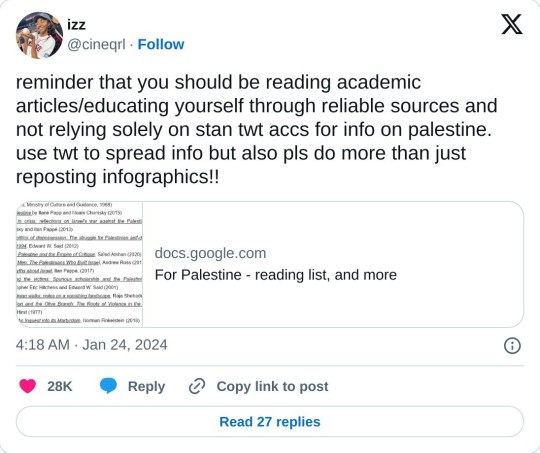
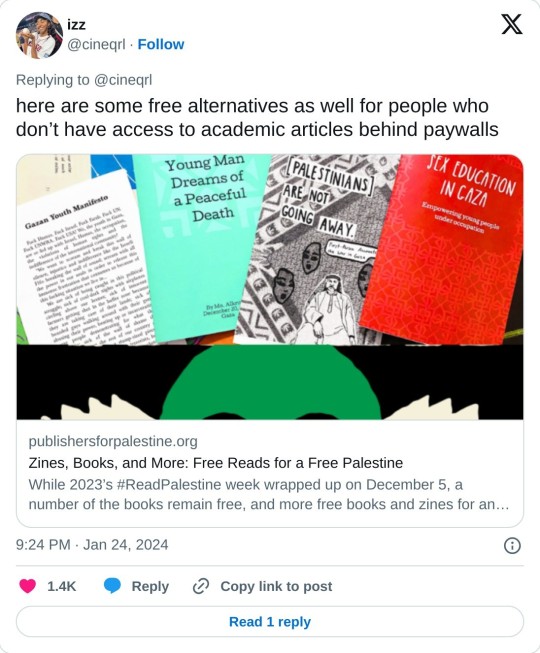
A copy of the first reading list, if you dislike clicking on Google docs links:
The liberal news media is working overtime to silence Palestinian voices. As we sit thousands of miles away, witnessing the massacre through social media, the least we can do is educate ourselves and work to educate others. Apartheid threatens all of us, and just to reiterate, anti-Zionism ≠ antisemitism.
Academic Works, Poetry and Memoirs
The Revolution of 1936-1939 in Palestine: Background, Details, and Analysis, Ghassan Kanafani (1972)
Palestinians: From Peasants to Revolutionaries, Rosemary Sayegh (1979)
Popular Resistance in Palestine: A History of Hope and Empowerment, Mazin Qumsiyeh (2011)
My Life in the PLO: The Inside Story of the Palestinian Struggle, Shafiq al-Hout and Jean Said Makdisi (2019)
My People Shall Live, Leila Khaled (1971)
Poetry of Resistance in Occupied Palestine, translated by Sulafa Hijjawi (Baghdad, Ministry of Culture and Guidance, 1968)
On Palestine by Ilan Pappé and Noam Chomsky (2015)
Gaza in Crisis: Reflections on the US-Israeli War Against the Palestinians, Noam Chomsky and Ilan Pappé (2013)
The Politics of Dispossession: The Struggle for Palestinian Self-Determination, 1969-1994, Edward W. Said (2012)
Queer Palestine and the Empire of Critique, Sa’ed Atshan (2020)
Stone Men: The Palestinians Who Built Israel, Andrew Ross (2019)
Ten Myths About Israel, Ilan Pappé (2017)
Blaming the Victims: Spurious Scholarship and the Palestinian Question, Christopher Eric Hitchens and Edward W. Said (2001)
Palestinian Walks: Notes on a Vanishing Landscape, Raja Shehadeh (2010)
The Gun and the Olive Branch: The Roots of Violence in the Middle East, David Hirst (1977)
Gaza: An Inquest into Its Martyrdom, Norman Finkelstein (2018)
Fateful Triangle: The United States, Israel and the Palestinians, Noam Chomsky (1983)
Israel and Palestine: Reappraisals, Revisions, Refutations, Avi Shlaim (2010)
Politicide: Ariel Sharon’s War Against the Palestinians, Baruch Kimmerling (2006)
The Holocaust Industry: Reflections on the Exploitation of Jewish Suffering, Norman G. Finkelstein (2015)
Light in Gaza: Writings Born of Fire, Jehad Abusalim (2022)
Nakba: Palestine, 1948, and the Claims of Memory, Ahmad H. Sa’di and Lila Abu-Lughod (2007)
Peace and its discontents: Essays on Palestine in the Middle East peace process, Edward W. Said (2012)
Three Poems by Yahya Hassan
Articles, Papers & Essays
“Palestinian history doesn’t start with the Nakba” by PYM (May, 2023)
“What the Uprising Means,” Salim Tamari (1988)
“The Palestinians’ inalienable right to resist,” Louis Allday (2021)
“Liberating a Palestinian Novel from Israeli Prison,” Danya Al-Saleh and Samar Al-Saleh (2023)
Women, War, and Peace: Reflections from the Intifada, Nahla Abdo (2002)
“A Place Without a Door” and “Uncle Give me a Cigarette”—Two Essays by Palestinian Political Prisoner, Walid Daqqah (2023)
“Live Like a Porcupine, Fight Like a Flea,” A Translation of an Article by Basel Al-Araj
Films & Video Essays
Fedayin: Georges Abdallah’s Fight (2021)
Naila and the Uprising (2017)
Off Frame AKA Revolution Until Victory (2015)
Tell Your Tale Little Bird (1993)
The Time That Remains (2009)
“The Present” (short film) (2020)
“How Palestinians were expelled from their homes”
Louis Theroux: The Ultra Zionists (2011)
Born in Gaza (2014)
5 Broken Cameras (2011)
Little Palestine: Diary of a Siege (2021)
Al-Nakba: The Palestinian catastrophe - Episode 1 | Featured Documentary
Organisations to donate to
Palestine Red Crescent Society - https://www.palestinercs.org/en
Anera - https://support.anera.org/a/palestine-emergency
Palestinian American Medical Association - https://palestinian-ama.networkforgood.com/projects/206145-gaza-medical-supplies-oct-2023
You First Gaza - https://donate.gazayoufirst.org/
MAP - Medical Aid for Palestinians - https://www.map.org.uk/donate/donate
United Nations Relief and Works Agency - https://donate.unrwa.org/-landing-page/en_EN
Palestine Children’s Relief Fund - https://www.pcrf.net/
Doctors Without Borders - https://www.doctorswithoutborders.org/what-we-do/where-we-work/palestine
AP Fact Check
https://apnews.com/article/israel-hamas-gaza-misinformation-fact-check-e58f9ab8696309305c3ea2bfb269258e
This list is not exhaustive in any way, and is a summary of various sources on the Internet. Please engage with more ethical, unbiased sources, including Decolonize Palestine and this list compiled by the Palestinian Youth Movement.
323 notes
·
View notes
Note
Hi, I really liked your art and all and was a fan of you, until you started posting things about supporting a state which is controlled by a terrorist organization that doesn’t care about their own civilians and when any donations come there it doesn’t go to the people who need it but to Hamas, and by donating to Gaza not only do you not help the people in Gaza ,but you also help a terrorist organization who doesn’t care who it needs to kill in order to achieve its goal.
Also when I saw you reposted a post who supported the people in the picture’s with all PLO flags (which weren’t the main problem there) ,it seriously hurt me to see that one picture where people were stepping on USA flags and Israel flags. like….why would you support someone who obviously hate you(assuming you’re from the USA) but even if you aren’t from the USA then think about the fact that you’re LGBTQ, these people HATE people who are Queer and kills them ,so I really can’t understand how are you supporting people who want you dead and are against feminism.
I really hope that what I wrote helped you see this complex situation more clearly and I beg you to look at the situation from both sides.
so this means everyone there deserves to die? this means that a whole school year of children needs to be wiped out? that hospitals must be bombed and millions displaced and communication be cut off? that every palestinian must pay with their lives? that every closeted queer palestinian should die? are you seriously that dense. i made it clear i do not want people who support a genocide following me. have you bothered reading palestinian voices from queering the map? those who regret not saying they were in love and dont even have the chance anymore because thousands are dying? i genuinely don't know what to say to you to make you realize these are real, actual people who are dead. you speak of palestinians as if they're a monolith and not real individual people who had thoughts and dreams. none of these people deserved to die, even if they hate people like me. people can change and learn and grow and they weren't even given the chance. i am so sick of seeing fellow queer people SUPPORT GENOCIDE because they can't be bothered to think about others and their experiences for more than two seconds. of all the queer experiences i've read this is one of the most heartbreaking, and it's from gaza.
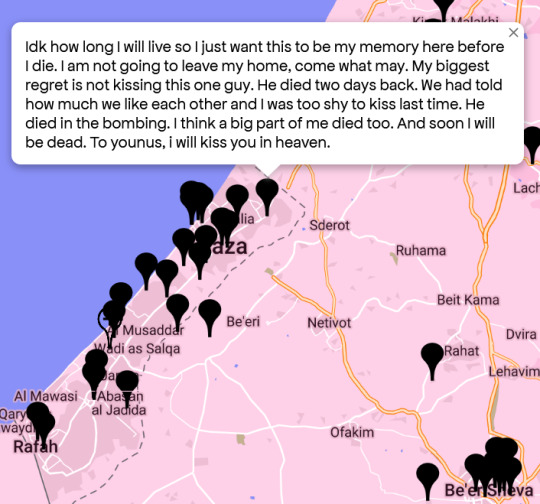
do NOT act like queer people and their families aren't being harmed and DO NOT come into my ask box supporting ethnic cleansing. there is never any reason for thousands of people to live in fear of airstrikes and white phosphorous, or to be stuck beneath rubble and in hospitals that don't even have power. if the idea of THOUSANDS DYING wasn't enough to upset you, there are so many videos of parents mourning their children, children mourning their parents, children and pets shaking in fear for me to not have explain to you that genocide is bad. there is NEVER any reason to JUSTIFY GENOCIDE. that should be clear enough. again, if you are complicit or try to justify genocide, do not follow me and DO NOT try to make me "see the situation from both sides". to be so privileged that you can sit here and write out paragraphs supporting genocide says enough about you.
if you see this i am begging you to contact your government, just do anything you can. even just spreading the word helps because palestine can't. the most important thing is to not give up hope. mourn the dead, and fight like hell for the living.
#genuinely sick of seeing this take from FELLOW QUEER PEOPLE#they arent going to stop at palestine#palestine#israel#gaza#free gaza#ceasefire
343 notes
·
View notes
Text
5 Tips for Building a Sustainable Writing Practice
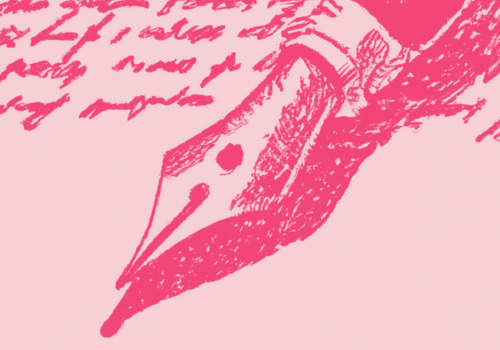
Every year, we’re lucky to have great sponsors for our nonprofit events. First Draft Pro, a 2023 Camp NaNoWriMo sponsor, is a great writing app—whether you’re writing solo or with a co-author. Here are a few tips for building a sustainable writing practice, brought to you by author Ariana Brown and First Draft Pro.
We’ve all heard the advice to “write every day,” as if it were that easy! Translation: suck it up, no one cares if you’re tired. But what if there was another way to get writing done, without being unkind to yourself?
Hi, I’m Ariana Brown, and I teach writers how to create a writing practice that is sustainable, flexible, and fulfilling. Most of my students are chronically ill, disabled, neurodivergent, or simply exhausted from the daily stresses of life. I know writing isn’t your only responsibility—capitalism makes sure of that! But I strongly believe that writing should be an enjoyable activity you look forward to.
Below I’ve compiled my top tips for exhausted writers who want to be kinder to themselves—and still get the work done.
1. Add pleasure to your writing routine.
Sensory pleasures are neither frivolous nor are they only for children. They’re a crucial part of being alive! They give us something to look forward to when times are tough and we need motivation. Candles, soft blankets, cold beverages, mood lighting, dance breaks, yummy treats—whatever you choose, make sure it’s something you love. Paint your nails a fun color so you have something beautiful to look at while you’re typing away. Make a playlist of your favorite songs and after you finish a chapter, blast one song so loudly you have to get up and dance. Then, get back to writing. Remember, even for the most focused among us, pleasure is a better motivator than shame.
2. Be clear about your intentions.
What brought you to writing in the first place? For some, it was the ability to escape into our imaginations. For others, it was the chance to finally express what we’d been holding inside. Identify your reason for writing, then ask yourself: Am I still enjoying this? Do I still feel connected to my reason for writing? If not, explore how you can strengthen your connection to your inner child’s reason for writing.
3. Work with your brain, not against it.
If we know that everyone’s brain works differently, why do we force strict discipline and linear processes on ourselves? My advice: find or create a writing process that works for you. Maybe you love outlines; maybe you prefer to see where the words take you. Either way, make space for wandering, play, and discovery as you write. Take brain breaks. Doodle, map, dance, and draw when you get distracted. Body double with other writers, try new exercises and prompts to make the writing sing, and take plenty of breaks to stretch your body and talk to friends. We come to writing with our whole selves. Listen to your body, don’t shut it off.
4. Find a writing community.
You don’t have to wait for a community to come to you! I offer co-writing sessions on Zoom four times a month for my Patreon supporters, but do what works for you. Attend local open mics as an audience member and cheer on your peers. Invite your best friends to your living room once a month for a two hour writing/crafting session. Or check your local library and bookstores for free workshops and author events. You don’t have to do this work alone.
5. Develop a gratitude practice.
Finishing your draft is a huge accomplishment, but it’s not the only milestone to be celebrated. Consider creating opportunities to thank yourself throughout your writing practice. You’re doing an amazing and difficult thing. The fact that you keep showing up is worthy of celebration. Whether you decide to journal, rest, pray, meditate, or reward yourself, a little gratitude goes a long way.

Ariana Brown is a queer writer from San Antonio, TX, based in Houston. She is the author of We Are Owed (Grieveland, 2021) and Sana Sana (Game Over Books, 2020), and a national collegiate poetry slam champion. Ariana holds an MFA in Poetry, MS in Library and Information Science, and a BA in African Diaspora Studies and Mexican American Studies. She has been writing, teaching, and performing for over a decade. Follow her online @ArianaThePoet and www.arianabrown.com.
#nanowrimo#writing advice#executive dysfunction#neurodivergent writers#disabled writers#by nano sponsor#first draft pro#ariana brown
410 notes
·
View notes
Text
sorry side note before i go back to drawing bc this chick bothering my mutuals now
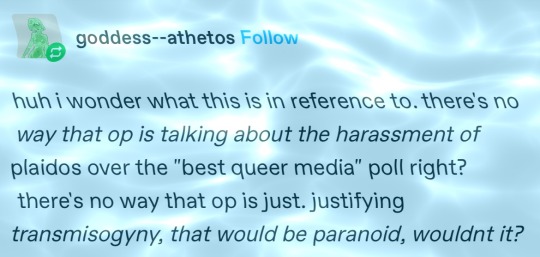
plaidos name dropped me first and accused me of starting a death threat campaign against hussie and homestuck fans on a poll i never reblogged or even linked that existed 4 days prior to me even knowing about it, but while on the subject it’s cool to see this post floating around

implying that real criticisms of racism or other bigotry towards white people is fear mongering “social justice” attacks bc u surround urself with equally antiblack users that shield themselves with queerness as if that distances themselves from white supremacy, and also love the implication that trans women are all white and twoc aren’t effected by u implying any racism criticism is inherently transphobic but going back to that first part of your post about pedophilia, u are literally a self identifying map, aka a pedo, you said that, urself, in ur pinned post
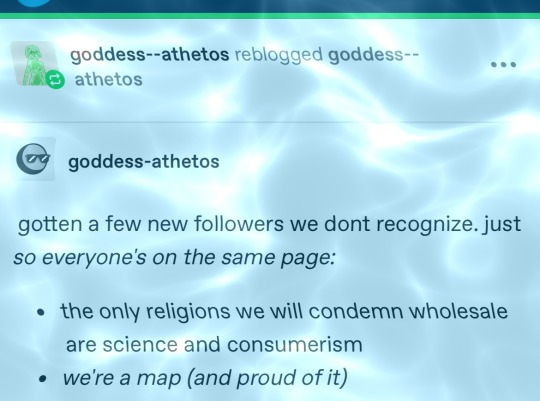
i’m gonna keep fighting this for as long as these ppl keep trying to twist the narrative and attack my mutuals but i didn’t even know plaidos existed until she name dropped me, got me all kinds of threatening harassment so bad that i had to turn off anon, and lied saying i incited death threats to a person NOT on tumblr and mocked me for making a post upset with being accused of all these things i didn’t do, but yeah sure me and other users including other trans girls ( that ur side is actively reporting and getting deleted for not agreeing with) don’t like you bc of ur gender and not bc of ur antiblackness and self identifying as a map
129 notes
·
View notes
Text
Recognizing this central ambivalence in regard to so-called Western values—whereby they are cast out as “postmodern authoritarianism” only to be embraced as the “true spirit” of societies to come—is essential to understanding the strategic significance of the anti-gender misappropriation of postcolonial language. This ambivalence sheds light on the fact that the superficial takeover frames the “gender ideology” colonizer not simply as the “West as such but [rather as] the West whose healthy (Christian) core had already been destroyed by neo-Marxism and feminism in the 1960s” (Korolczuk and Graff 2018: 812). Very often, the anti-gender misappropriation takes on a decidedly Islamophobic hue; for all their catering to anticolonial sentiments, anti-gender thinkers often claim that “gender ideology,” with its historical roots in anti-European “neo-Marxism and feminism,” goes hand in hand with the threat of (Muslim) immigration. A blatant example of this can be found in former Cardinal Sarah’s proclamation against the two unexpected threats of our times:
On the one hand, the idolatry of Western freedom; on the other, Islamic fundamentalism: atheistic secularism versus religious fanaticism. To use a slogan, we find ourselves between “gender ideology and ISIS.” . . . From these two radicalizations arise the two major threats to the family: its subjectivist disintegration in the secularized West [and] the pseudo-family of ideologized Islam which legitimizes polygamy [and] female subservience. (Sarah 2015)
Sarah aggressively draws up a dual picture of the true enemy—the biopolitical survival of the family is threatened on the one hand by excessive secularization and sexual freedom, and on the other by “ideologized Islam’s pseudo-family,” which marks the degraded and uncivilized counterpart to Christianity’s proper tradition. This discursive construction of “terrorist look-alikes” as possessing an excessive, uncultivated, and dangerous sexuality yet again plays into the same fundamental racialized mapping of progress that colonial gender undergirded (Puar 2007). This rhetoric is mirrored by Norwegian right-wing politician Per-Willy Amundsen (2021) when he writes that:
I will never celebrate pride. First of all, there are only two sexes: man and woman, not three—that is in contradiction with all biological science. Even worse, they are allowed access to our kids to influence them with their radical ideology. This has to be stopped. If FRI [the national LGBT organization] really cared about gay rights, they would get involved in what is happening in Muslim countries, rather than construct fake problems here in Norway. But it is probably easier to speak about “diversity” as long as it doesn’t cost anything. (Amundsen 2021; translation by author)
Here Amundsen draws on the well-known trope of trans* and queer people “preying on our kids” while at the same time reinforcing the homonationalist notion that Europe, and in particular Norway, is a safe h(e)aven for queer people—perhaps a bit too much so. In his response to Amundsen, Thee-Yezen Al-Obaide, the leader of SALAM, the organization for queer Muslims in Norway, aptly diagnoses Amundsen’s rhetoric as “transphobia wrapped in Islamophobia” (as quoted in Berg 2021). Amundsen mirrors a central tenet of TERF rhetoric by claiming to be the voice of science, biology, and reason in order to distinguish his own resistance to “gender ideology” from the repressive, regressive one of Muslims. In this way, his argumentation, which basically claims that trans* people don’t exist and certainly shouldn’t be recognized legally, attempts to come off as benign, while Muslim opposition to “gender ideology” is painted as destructive and anti-modern.
This double gesture, which allows Amundsen to have his cake and eat it too, is a central trope in different European iterations of anti-gender rhetoric. In France, for example, such discourse claims that, “while ‘gender ideology’ goes too far on the one hand, the patriarchal control of Islam threatens to pull us back into an excessive past. Here of course, ‘Frenchness’ is always already neither Muslim, nor queer (and certainly not both)” (Hemmings 2020: 30). Therefore the French anti-gender movement sees itself as the defender of true Western civilization, both from Western “gender ideology” and from uncivilized “primitives” who are nevertheless themselves victims of “gender ideology.” A similar dynamic plays out in Britain: “Reading Muslims as dangerous heteroactivists and Christians as benign points to how racialization and religion create specific forms of heteroactivism. . . . Even where ‘Muslim parents’ are supported by Christian heteroactivists, they remain other to the nation, and not central to its defence” (Nash and Browne 2020: 145). In the British example, it is clear that white anti-gender actors represent themselves as moderate, reasonable, and caring—often claiming that their resistance to the “politicization” of the classroom has nothing to do with transphobia and homophobia.
Is “Gender Ideology” Western Colonialism? Jenny Andrine Madsen Evang
90 notes
·
View notes
Text

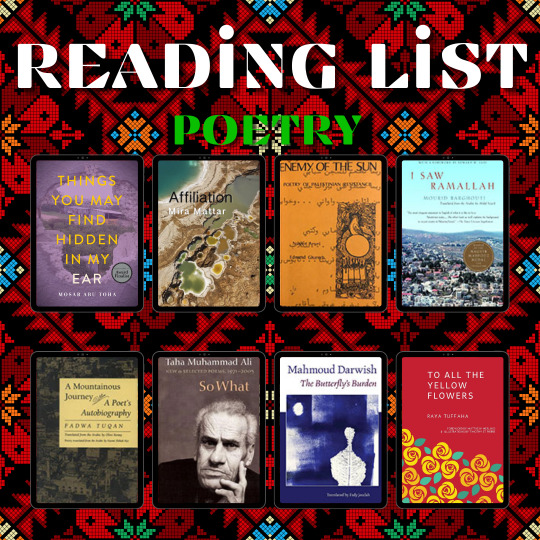
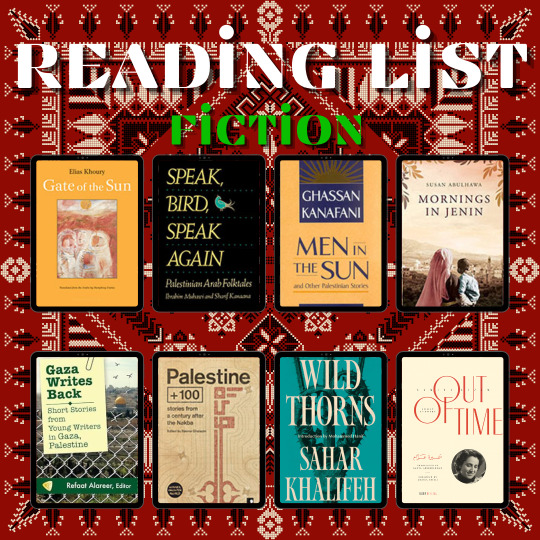
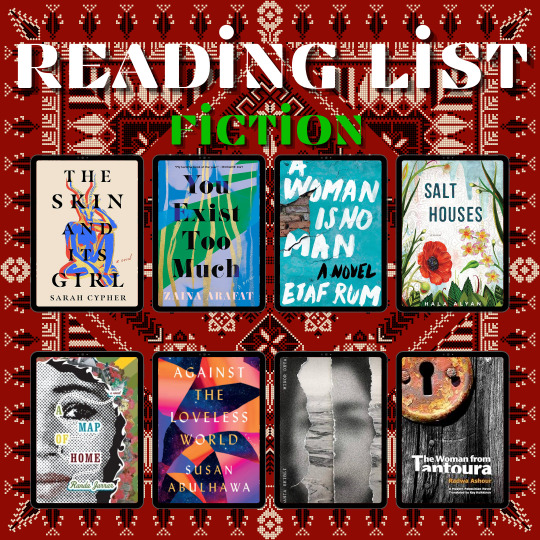
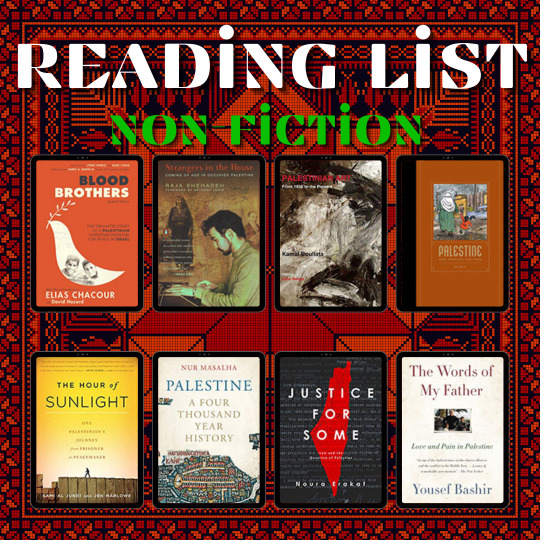

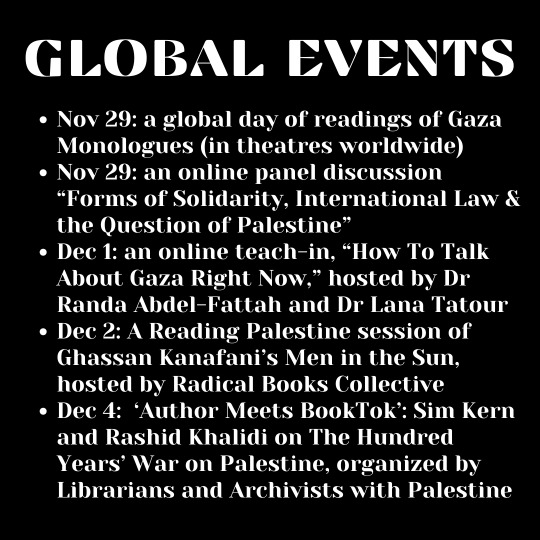
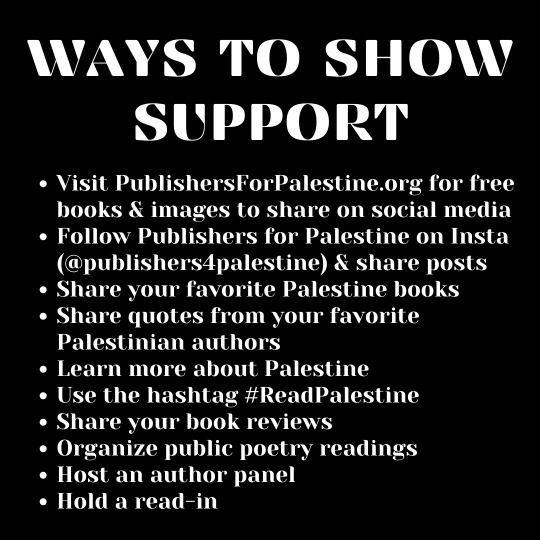
Read Palestine Week
🇵🇸 Good morning, my beautiful bookish bats. Can I start by saying a huge THANK YOU for sharing my Queer Palestinian Book post? Seriously, thank you so much. Let's keep that momentum by observing Read Palestine Week (Nov 29 - Dec 5). I've compiled a list of books to help you, along with a list of upcoming events and resources you can use this week and beyond.
🇵🇸 A collective of over 350 global publishers and individuals issued a public statement expressing solidarity with the Palestinian people. Publishers for Palestine have organized an international #ReadPalestine week, starting today (International Day of Solidarity with the Palestinian People).
🇵🇸 These publishers have made many resources and e-books available for free (with more to come). A few include award-winning fiction and poetry by Palestinian and Palestinian diaspora authors. You'll also find non-fiction books about Palestinian history, politics, arts, culture, and “books about organizing, resistance, and solidarity for a Free Palestine.” You can visit publishersforpalestine.org to download some of the books they have available.
POETRY
🌙 Things You May Find Hidden in My Ear by Mosab Abu Toha
🌙 Affiliation by Mira Mattar
🌙 Enemy of the Sun by Samih al-Qasim
🌙 I Saw Ramallah by Mourid Barghouti
🌙 A Mountainous Journey by Fadwa Tuqan
🌙 So What by Taha Muhammad Ali
🌙 The Butterfly’s Burden by Mahmoud Darwish
🌙 To All the Yellow Flowers by Raya Tuffaha
FICTION
🌙 Gate of the Sun by Elias Khoury
🌙 Speak, Bird, Speak Again: Palestinian Arab Folktales
🌙 Men in the Sun by Ghassan Kanafani
🌙 Morning in Jenin by Susan Abulhawa
🌙 Gaze Writes Back by Young Writers in Gaze
🌙 Palestine +100:Stories from a Century after the Nakba
🌙 Wild Thorns by Sahar Khalifeh
🌙 Out of Time by Samira Azzam
🌙 The Skin and Its Girl by Sarah Cypher
🌙 You Exist Too Much by Zaina Arafat
🌙 A Woman is No Man by Etaf Rum
🌙 Salt Houses by Hala Alyan
🌙 A Map of Home by Randa Jarrar
🌙 Against the Loveless World by Susan Abulhawa
🌙 Minor Detail by Adania Shibli
🌙 The Woman From Tantoura by Radwa Ashour
NON-FICTION
🌙 Blood Brothers by Elias Chacour
🌙 Strangers in the House: Coming of Age in Occupied Palestine by Raja Shehadeh
🌙 Palestinian Art, 1850–2005 by Kamal Boullata
🌙 Palestine by Joe Sacco
🌙 The Hour of Sunlight: One Palestinian’s Journey from Prisoner to Peacemaker by Sami Al Jundi & Jen Marlowe
🌙 Palestine: A Four Thousand Year History by Nur Masalha
🌙 Justice for Some: Law and the Question of Palestine by Noura Erakat
🌙 The Words of My Father: Love and Pain in Palestine by Yousef Khalil Bashir
🌙 Traditional Palestinian Costume: Origins and Evolution by Hanan Karaman Munayyer
🌙 Mountain against the Sea: Essays on Palestinian Society and Culture by Salim Tamari
🌙 This Is Not a Border: Reportage and Reflection from the Palestine Festival of Literature
🌙 We Could Have Been Friends, My Father and I: A Palestinian Memoir, by Raja Shehadeh
🌙 Les échos de la mémoire. Une enfance palestinienne à Jérusalem, by Issa J. Boullata
🌙 A Party For Thaera: Palestinian Women Write Life In Prison
🌙 Light in Gaza: Writings Born of Fire,
🌙 Voices of the Nakba: A Living History of Palestine
#free palestine#save palestine#books#book list#book recs#book recommendation#booklr#book blog#batty about books#battyaboutbooks#arab american heritage month#arab american writers#palestinian writers#palestinian poetry#poetry#poetry books#nonfiction#fiction books#queer fiction#queer community#queer books#muslim writers#read palestine week
212 notes
·
View notes
Note
I read your post about Supernatural being queer somehow from season 1 and I have two questions.
1. Don't you think it straight-appropriates the word "queer" to say it just means "not normal"? That argument seems disingenuous to me, and a lot of us want representation, and to see that word applied to explicit depiction of queer sexuality, and it's a cheat that they don't. Queer studies did start as the study of queer sexualities and the experience of queer people.
2. Are you saying that the makers of Supernatural intended for it to be "flesh on queer bones"? Do you think they intentionally sat down to tell a queer story?
Those are good questions my anonymous friend. Thank you for asking. Here are my thoughts:
To answer your first question: no, I don't think it appropriates anything. Here's why: firstly, if we're talking about sexuality and gender, it's queer 101 that no one owes anyone a justification of their queerness, and not everyone who is queer is interested in labeling it or making it legible to you, and they have no obligation to do so, and not doing so doesn't make them any less queer. Furthermore, some people who are queer are not interested in sex, so what about them?
All of that together is why, for me, the entire queer project is much more deeply about non-compliance with hegemony, and specifically with hegemony around gender roles, sexuality and to put it under a big umbrella, patriarchy, than it is about who you fuck. Those things extend into so many other aspects of life that I think you can easily talk about "queering" a very wide range of topics, and possibly? ANY TOPIC.
You are responding to this post, I think, and in it, I made a choice to talk about family and hunting, and our heroes roles and characterizations in that, and did not talk about gender shenanigans or sexuality, because my point was that even before we get to anything to do with it, Sam and Dean are immersed in a queered world in a fundamental, structural way. That said, I assure you that if you go back into season 1 of Supernatural, you will find LOADS that could be said about gender and sexuality, too. As well as other things, and a particularly important area, as @ironworked pointed out in the tags, is blue collar/white collar class issues.
As I said, the depth of queerness in Supernatural is actually dizzying just in terms of the story's BONES to say nothing of how they flesh it out. Queerness is about deviation from the norm. It's about rebellion and disobedience against hegemonic systems for the sake of personal authenticity and love.
Think about Cas for a minute. Cas's whole story is that he rejects his role in a hegemonic heaven. He rebels for love, and that is pretty explicit as early as season 4 when he tells Dean "We're making it up as we go". Fellas, that is THE QUEEREST SHIT EVER even if he didn't do it for Dean, and like... HE DID IT FOR DEAN. Cas did not have to tell Dean he loved him for me to know it, and for Cas to be a deeply queered character. When he DID say it, I wasn't the least bit surprised he was in love with Dean, because seriously, we been knew. I was only surprised I got to have the immense pleasure of hearing him say it and looking at Dean's face while he took it in. Jesus. I will NEVER RECOVER.
This is my perspective on representation in Supernatural: It's excellent, and I relate to, and feel seen by it as a queer person. Nobody needs to get fucked on the maps table for me to do the math that this is a queer story. It is very, very, very thoroughgoingly canonically queer in so many ways, and not all of them are to do with sex. I think some fans will only allow it to be called queer if dudes make out in it. I am not one of those fans.
As to your second question, I think there is a wealth of evidence in the filmic oeuvre of Eric Kripke to suggest that as an artist and a writer, he is concerned or maybe even preoccupied with masculinity issues and issues around family, and around the way patriarchy fucks men up. So, yes. I think he knew what he was doing and he knew that queerness was part of the mix. For fucks sake, it's a family of men who hunt monsters. That is very fucking on the nose. Do I think he kicked off Supernatural in 2005 planning a 15 year operatic queer romance between Cas and Dean? No. I don't think anyone planned for it to go as long as it did, and it's a matter of record that some things were influenced by fan response, actors' chemistry, different writers and showrunners' preferences and etc. What I will say is that when they had a choice to "straighten shit out" or lean into the queerness, they fucking leaned in, nearly EVERY TIME. Like, it's pretty amazing how consistently they lean the fuck in.
I'll admit -- I wasn't watching it with those eyes the first time, and I didn't give it much real estate in my mind when I watched it as it aired from 2006 to the end, but the last three episodes reshaped it for me and made me angry, and also made me need to watch it all again, this time with an explicitly queer lens, and BOY HOWDY let me tell you this: the Supernatch rewatch journey is a wild and wonderful trip to Queertown. It is legit more difficult to argue that Dean is straight than it is to argue that he is queer. There is a full on CORNUCOPIA of story evidence to support that read and relatively little that convincingly counters it on the straight side, and that starts right at the beginning, when they bend pretty baby Dean over a police car in episode one, and he smirks insouciantly in his lip gloss. Do I think everyone involved knew how that looked? Sexy, submissive and a bit gay?
YES I DO.
#supernatural#spn#dean winchester#Eric Kripke#watching with queer goggles#I recommend it#it's just queer yo#anti-trashnatural agenda
127 notes
·
View notes
Text
[“In a 2019 tweet (since deleted), Twitter user Brooke wrote of ‘carving “trans” into every bone of my body so when they find my skeleton in two hundred years they don’t get too confused’. A reply parodied the response of an oblivious archaeologist: ‘We must be careful not to jump to conclusions about what these ancient carvings could have meant; This individual could have had a passion for mass transit, transcontinental travel, or a combination of poor spelling and a love of trance music’.
Every time I read jokes like this, I get a jolt of hurt and defensiveness: not all historians and academics are like that! I try so hard, every day, not to do the kind of history they’re talking about! And yet I can hardly blame these people for talking and writing the way they do. The fact is that the discipline of history is set up to erase queer lives, and particularly trans lives. We are expected to adhere to double standards of evidence, which encourage us to state with impunity that a historical figure was definitely cis, but to hedge with caveats the suggestion that they were maybe, possibly trans; to use phrases like ‘cross-dresser’ or ‘impersonator’ as if they’re neutral, and to write lengthy defences of ourselves if we decide to avoid them; to expect backlash from colleagues and reviewers if we choose to use any pronouns for a historical figure other than those associated with the gender they were assigned at birth; to say, like the caricatured archaeologist above, ‘We must be careful not to jump to conclusions’, even when the evidence for trans experience is actually abundantly conclusive. It hurts when people memeify the oblivious, transphobic ‘historian’, but it’s also not unfair of them to do it. History, while it may not perpetuate physical harm, still repeatedly enacts violence against trans lives in the past and the present. And it’s not the job of the communities we’ve hurt to give us the benefit of the doubt: it’s our job to convince them that historians can be different.
In this book, I’ve identified new ways, and new places, to look for trans history. I’ve argued for the presence of trans experience in histories of gender-nonconforming fashion; histories of gender-nonconforming performance; and histories of people taking on a social role that isn’t associated with the gender they were assigned at birth. I’ve shown that many trans histories are inextricable from histories of other experiences: the sexual, the intersex, the anti-patriarchal, the spiritual. I’ve argued both for acknowledging trans possibility in histories of widespread gender nonconformity that have previously been explained in other ways, and for understanding gendered histories on their own terms – including seeing them, where necessary, as both trans history and the history of other kinds of people and experiences.
In this last kind of history in particular, I’ve often been confronted by what writer and philosopher Hil Malatino (quoting fellow scholar Abram J. Lewis) calls the ‘irreducible alterity’ of people in the past: the fact that some histories of gender are not possible to map onto or relate to the way people experience gender today. Malatino characterises the acknowledgement of this ‘irreducible alterity’ as a form of care for those past people, an idea that speaks deeply to me. It struck me, when I first read it, how different this framing of ‘care’ was from the arguments historians more commonly make against describing people in the past as trans: that it is presentist, that it is anachronistic, that it inappropriately fixes past people in modern categories. These arguments have rarely seemed to me to come from a place of care for people in the past; instead their priority seems to be history or historiographical methodology as an abstract, faux-objective entity. Still more rarely do they seem to acknowledge the concurrent urgency of caring for people in the present: the people who are living now, experiencing and articulating their gender in manifold ways and drawing strength from the histories of people who have done the same. Might it not be possible to find ways of recognising the essential difference of people in the past – people who disrupted gender before we were trans – while simultaneously holding space for the feelings of identification with them held by people in the present, the people who are trans now?”]
kit heyam, from before we were trans: a new history of gender, 2022
1K notes
·
View notes
Note
Would love to hear what your word alternative is to describe the specific oppression faced by trans men because base level "word means this and can only mean this and has to be able to mean the same thing when broken down to it's base words" is "bi means two so bisexuals don't like enbies" levels of bullshit on both a social and linguistic sense. Trans men experience transphobia and mysogny specific to them on top of other oppressions that is not experienced by other trans people or cis women and the chosen word is transandrophobia, the oppression and specific hatred of trans men. Transmysogny describes transfem specific oppression, transphobia covers all trans oppression experiences, what can transmascs call our oppression since one word in it apparently offends you? If its just the name that offends you, what's an alternative? Idk how to tell you that trans men do experience oppression for, in cis people's eyes, "trying" to identify as men therefore yes, they experience oppression for being men, trans men specifically. The word androphobia is loaded but so is the word queer or gay or homosexual or literally every other language used by the lgbt community. All around, yikes.
Your literally only looking at it from the perspective that cis people see trans men as men, just trans ones therefore they dont attack or question their manhood, just the fact their trans. When they don't. They see us as ugly, immature and disfigured women who don't know our place. This idea that trans men's oppression just evaporates and they suddenly gain male privilege when they transition to any degree, regardless of medical or passing status is bs. Idk how to tell you they are experiencing oppression for being trans and specifically trying to transition from womanhood to manhood due to our society's view of what women should be. But sure, take all my shit out of context and post one screenshot. You really proved a point by ignoring trans men's oppression and deaths as a result of their transmasculinity, I'm sure Nex can really attest to our sudden transmasc privileges. Didn't realize you were the most surface level "men = bad. Men face no issue in society." type of "feminist".
Would love to hear what your word alternative is to describe the specific oppression faced by trans men
"transphobia".
Transmysogny describes transfem specific oppression,
transmisogyny is the synthesis of transphobia and misogyny that trans women face. the reason trans women get their own word is because that word represents the intersection of two different axes of oppression, not because every trans identity needs its own descriptor for hatred against it specifically.
transphobia covers all trans oppression experiences, what can transmascs call our oppression since one word in it apparently offends you?
...you answered your own question, "transphobia".
If its just the name that offends you, what's an alternative?
"transphobia".
trans men do experience oppression for, in cis people's eyes, "trying" to identify as men
this is transphobia.
The word androphobia is loaded but so is the word queer or gay or homosexual or literally every other language used by the lgbt community. All around, yikes.
Lol. Lmao, even.
Your literally only looking at it from the perspective that cis people see trans men as men, just trans ones therefore they dont attack or question their manhood, just the fact their trans. When they don't. They see us as ugly, immature and disfigured women who don't know our place.
wow, so the reason cis people are biased against trans men is because they see them as fundamentally being failed examples of the gender they were assigned at birth and lying about their actual gender identity? damn, that's wild. if only there was a name for this phenomenon that could also map onto other trans identities to provide a unifying framework for analysis.
This idea that trans men's oppression just evaporates and they suddenly gain male privilege when they transition to any degree, regardless of medical or passing status is bs.
literally not what this discussion is about.
Idk how to tell you they are experiencing oppression for being trans and specifically trying to transition from womanhood to manhood due to our society's view of what women should be.
you are describing transphobia.
I'm sure Nex can really attest to our sudden transmasc privileges.
what the fuck? 2. Nex was nonbinary not transmasc? 3. what the fuck?
Didn't realize you were the most surface level "men = bad. Men face no issue in society." type of "feminist".
hello? what year is it? can anyone hear me? it's so cold
123 notes
·
View notes
Text
Daniel Villareal at LGBTQ Nation:
Anyone with eyes in their head can see that the American government and media both have a clear pro-Israel and anti-Palestinian bias. Neither one officially recognizes Palestine as a state, and any criticisms against the Israeli government or in favor of Palestinian civilians are automatically labeled (at best) as ignorant, misinformed, and over-idealistic or as hateful, antisemitic, and pro-terrorist.
The goal of these denunciations seems to have only one aim: to silence any criticism of Israel. I’m sick of it… and I’m not alone.
In numerous conversations, when I have argued that perhaps the Israeli government is becoming increasingly right-wing, I have been told that Israel is a queer oasis in the bigoted Middle East and that all of Israel’s neighboring countries are rabidly anti-LGBTQ+ and will gladly kill their own queer citizens.
When I mention that Israel’s military-enforced policies of forced displacement and segregation against Palestinian citizens could violate their dignity and human rights, I’m reminded of the Holocaust — as if I somehow forgot — and am told that Hamas wants to exterminate Israel and all Jews and that all of Israel’s neighboring countries have threatened to wipe Israel off the map as well.
If I mention any recent news report about Israeli forces killing Palestinian journalists or civilians, I’m informed that I do not know my history and that Palestine’s government has repeatedly allowed terrorists from its region to infiltrate Israel and commit atrocities against innocent Israelis.
[...]
When any politician or activist publicly criticizes Israel in the media, they’re denounced, and we’re told that we must defend Israel at all costs to protect stability and U.S. interests in the Middle East and to offer a shining beacon of Western democracy to the people living in the otherwise barbaric region.
These talking points are reinforced by American media, which commonly depict Israel as a bustling modern nation and depict all other Middle Eastern countries as war-torn deserts consisting of mostly huts, murderers, and goats.
These things have all been pretty uniform throughout my entire life: Israel can do no wrong. To imply otherwise is to show your own stupidity or align with Nazis and terrorists. End of conversation. As if numerous progressive Jews and international human rights organizations, like Human Rights Watch and Amnesty International, haven’t asked the same questions or reached the conclusion that Israel is hardly above reproach.
The other not-so-subtle implication is that anyone who wants to criticize Israel openly should either be Jewish themselves or at least have university degrees in Israeli history, Middle Eastern studies, and international political science.
[...]
The October 7, 2023, Hamas terrorist attacks on Israeli civilians and recent reports that an estimated 35,000 Palestinians have died in Gaza since Israel’s military destroyed Palestinian homes, schools, hospitals, and vital infrastructure.
I’ve been thinking about it as more and more voters vote “uncommitted” in the Democratic primaries, signaling to President Joe Biden that America’s mostly unconditional support of Israel could cost him the election.
I’ve been thinking about it as bipartisan politicians urge mayors, police, and the National Guard to violently disband pro-Palestinian student encampments on university campuses rather than engage in good-faith discussions about the institutions’ investments in businesses that benefit from Israel’s conflict.
As a journalist, I would normally turn to trust U.S. news sources to learn more about what’s happening on the ground in Gaza. But journalists and aid workers are being killed there, media outlets that criticize Israel run the risk of driving advertisers away, and pro-Palestinian journalists sometimes get hate mail and death threats. As a result, I hear even less in the news about Palestine than I do about Africa.
I want to be clear: I denounce all terrorist actions and the murder of civilians, regardless of nationality. I support Israel and Palestine’s right to exist and the right of all people to peacefully practice their religion without any threats of violent persecution.
I acknowledge that antisemitism is real, that hateful attacks on Jewish people and neo-Nazi activity have increased over recent years, and that some of Israel’s critics are bigoted. I also know that some white Christian nationalists and Republicans who support Israel don’t actually approve of anyone who doesn’t embrace Jesus Christ as their personal lord and savior. Rather, they support Israel because of Biblical prophecies that say its existence will bring about Jesus’s return and the end of the world.
Daniel Villarreal wrote in LGBTQ Nation on how America needs to speak up on the abuses the Israel Apartheid government have heaped on Palestinians and the effects of silencing criticism of Israel has had adverse effects on discourse.
#Daniel Villarreal#LGBTQ Nation#Opinion#Palestine#Israel#Israel/Hamas War#Israel/Palestine Conflict#Israel Apartheid#Hamas#Gaza#Gaza Genocide#Campus Protests
53 notes
·
View notes
Text
One thing I love about the harringrove fandom is the agreement both that Steve is dyslexic and Billy is a MASSIVE reader.
Because while Steve’s always been surrounded by teachers or his parents or exes who either believe that he’s incapable of appreciating reading or that he just doesn’t care, Billy thinks that’s bullshit.
Because when Billy gets told to tutor Steve in English, he doesn’t start with a book for toddlers or fucking Shakespeare. They start with Billy reading him Wuthering Heights.
And at first Steve does not fucking get it. He doesn’t understand the plot, the message and especially not the dialect. But he finds himself enjoying it a lot. Billy’s a natural storyteller. He could be on stage.
Billy’s taste in books is both eclectic and weird. He’s reading Finnigan’s Wake for fun. In Irish. He likes Portuguese romance books and German surrealism and a lot of George Orwell. So much so that Steve kind of feels that love rubbing off on him.
He’d used to like reading. Before he was told he was doing it wrong. And even though he despised the books set by Hawkins High with every fibre of his being, there was this fire set in his belly, a want to impress Billy.
So he starts with The Hobbit. Eddie “Freak” Munson’s the only other dyslexic Steve knew and he loved that shit. How hard could it be?
The Hobbit is fucking difficult. It starts with a map, Steve thinks is in Elvish and some of the chapters feel like they go on forever. The words still bounce around the page and switch constantly. He likes it though. It’s weirdly fun as a story and he finds himself rooting for Bilbo.
Henderson can never know. That is the one thing Steve is certain of.
Billy doesn’t laugh when Steve tells him that’s what he’d decided to start with. He just rolls his eyes, not meanly and says he used to read that with his mom. Back in Cali. Before Neil fucked everything up.
Billy reads a lot of Oscar Wilde. The Importance of Being Earnest is constantly tucked into his back, dog eared and well loved. Steve knows enough about Oscar Wilde to know what that indicates.
Billy’s a poof. A faggot. A queer.
Billy is like Steve.
He doesn’t have the courage to look out for anything gay. Nothing even that hints at the matter. Steve knows that his dad has The Iliad tucked away in his office. He’s away on business while his mom sits in the kitchen and complains about America. Even after 15 years in the States, she still misses Poland.
His daring heist after she goes to bed leads to him sitting on the kitchen floor, crying about Achilles and Patroclus. Billy’s right, classics are a fucking bummer.
Steves not as stupid as other people think. He knows that if this were a book, him and Billy are hurtling towards deaths door. Even in real life, he’s seen the guys on tv, worn down to the bone on hospital beds.
Gay does not equal a happy ending.
He resolves to never touch The Iliad again.
Billy comes to their next session with a black eye and his mullet chopped off. They don’t talk about it.
1984 is depressing. And surprisingly apt for how Steve feels that his 1984 has gone. He does feel like he’s constantly being watched. Like being in love is illegal. Like saying anything too far against the government will have consequences.
Steve asks if Billy thinks Orwell wrote 1984 about America or Russia. Billy snorts but doesn’t answer.
That’s the note they end on for the year.
Christmas comes and goes. So does New Year. Two months of not seeing Billy aches in his gut.
Then he comes back.
It’s the middle of February. Billy’s been kicked out for a week. Steves playing nursemaid.
He’s beaten up pretty bad. Still, Billy insists he’s had worse.
Steve hedges around asking why it happened. Like the confirmation might suddenly make the full scope of their plight real.
Still, eventually Steve asks. Billy looks at him like he’s particularly simple.
He’s gay. Obviously Steve. And he actually has the balls to go out there, meet men, dance. Even if it does mean getting caught by Neil.
During his explanation, Steve notices they’ve gotten closer together. Like significantly closer.
They’re grazing hands. Electric.
Then Billy moves.
Billy kisses him and Steve’s world turns into a fucking supernova.
They kiss and it doesn’t make Neil vanish in a puff of smoke, it doesn’t make the shopkeepers who sneer at his mother go away, it doesn’t make Steve magically able to read.
But it does make Steve feel like maybe they’ll survive.
#billy hargrove#steve harrington#harringrove#harringrove ficlet#dyslexic steve harrington#tw homophobic language#tw abuse
61 notes
·
View notes